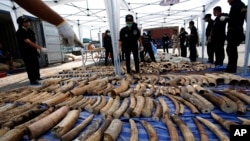Thai customs officials announced Monday one of the largest seizures of illicit ivory in transit in Southeast Asia.
The shipment, weighing four metric tons, was intercepted at the port in Bangkok on Saturday, authorities said as they displayed 739 tusks of African elephants.
"Moving a shipment of four tons halfway around the world is not a trivial undertaking." said Richard Thomas, global communications coordinator in London for TRAFFIC International, the wildlife trade monitoring network.
“Movements of this kind are very, very strongly indicative of organized crime.”
Although this latest seizure in Thailand, the most by weight in the kingdom's history according to a statement from Thai Customs, is considered very significant, it is not the largest ever in the region. Singapore made a 7.2 ton seizure in 2002 and Malaysia authorities intercepted six tons of ivory in 2012.
Thai authorities say the ivory, which was hidden in sacks of beans, originated in the Democratic Republic of Congo and was destined for Laos, making its likely final destination markets in China.
Thailand, the DRC and Nigeria are the three countries most implicated in the global illicit ivory trade.
Under fire
Thai authorities have become more aggressive in their attempts to seize illegal ivory shipments after the global regulator CITES (Convention on International Trade in Endangered Species) informed the kingdom that all of its wildlife business faces wide-ranging sanctions if it does not curb trade in tusks on its soil by August of this year.
Registered ivory from domesticated Thai elephants can be sold legally in Thailand. That loophole is blamed for making it easier for poached African ivory to be laundered through Thailand.
“The Thai authorities are certainly to be congratulated on making this very important seizure. But it does underline just how serious the nature of this illegal activity that is going on is,” said Thomas.
Environmentalists say 20,000 of the remaining 500,000 remaining African elephants were killed in 2013 - primarily poached for their ivory to meet demand in Asia.
China is estimated to be the destination for as much as 70 percent of the illegal ivory. For many modern middle class and upper class Chinese, ivory objects are believed to bring good luck or be a way to display status.














